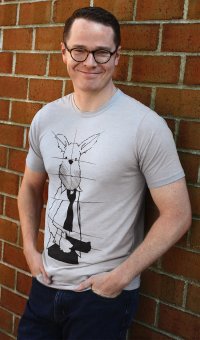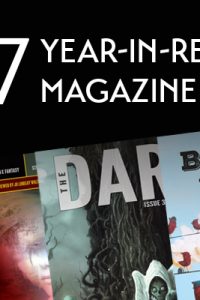Robert Jackson Bennett: Subreality
 Robert Jackson Bennett was born June 22, 1984 in Baton Rouge LA and lived all over the deep south before settling in Houston TX when he was ten. He attended college at the University of Texas at Austin, where he studied English and Government.
Robert Jackson Bennett was born June 22, 1984 in Baton Rouge LA and lived all over the deep south before settling in Houston TX when he was ten. He attended college at the University of Texas at Austin, where he studied English and Government.
Bennett’s debut novel Mr. Shivers (2010) won a Shirley Jackson Award, was a finalist for the Crawford Award, and earned him the Sydney J. Bounds Award for Best Newcomer. The Company Man (2011) received a special citation in the Philip K. Dick Awards and won an Edgar Award for Best Paperback Original. The Troupe appeared in 2012, and was followed by Shirley Jackson Award-winner American Elsewhere (2013). After four standalone novels set in (versions of) the real world, he switched to writing secondary-world fantasy with City of Stairs (2014), first in a series. Sequel City of Blades is forthcoming. He lives in Austin with his wife and son.
Excerpts from the interview:
‘‘With most books I write, what I have to do is think of a plot that’s going to get me to the shit I want to talk about, which is often the fear that you’re not experiencing the world the right way. What works in American Elsewhere that’s hard to pull off in my other books is that it’s got its own narrative voice where it can just stop and talk about things. There’s a part where the main character talks about a friend in school having to get new glasses, and her friend didn’t know her eyes were so poor, and she talks about why that was frightening. It’s a little bit harder in most books to pause that way and talk about stuff. When you get really invested in the character and less in the narrative voice, it’s harder to stop. It’s a long book. My wife started listening to the audiobook, and she was pretty pissed off. She said, ‘Four discs in, how many discs are there?’ ‘Eighteen.’ She’s like, ‘What the hell?’
‘‘The structure of American Elsewhere feels like a series of short stories that are connected. That was a lot of fun to write. I realized about four or five chapters in, ‘I’m hopping around a lot. Let’s just keep it up and see what happens.’ Suddenly what felt like a weakness seemed like it could be a strength. I could tell a short story about someone’s life, and have them seeing something but not understanding. This is a super pretentious thing to say, but one of the influences on the book was John Crowley’s Little, Big. That’s got a lot of short stories in it, small experiences in this world where you glimpse something from the side of your eye but you don’t really understand what’s happening. It’s got that slow build going on.”
…
‘‘I’ve always loved the Cold War and spy novels. I love the idea that there’s something fake and transient about those lives. These people are ghosts. They go from hotel room to hotel room. They exist in this interstitial realm in urban society. I found that really interesting, the idea that spies live in a subreality of our own. That’s something I’ve always had in my head, this idea of a bland little man at a desk in some hotel room waiting for a phone to ring. I found that fascinating. I started to think, if I was going to write a fantasy, how would I write it? I thought: a Cold War spy novel set in Lord of the Rings would be interesting. Who’s a mole, who’s turned, who knows what, what’s happening in this region, are there insurgents here, what’s the market like?”
…
‘‘I thought more about it and then I started inventing this history of a group of people who had gods and used them to create an empire. I tried to think about gods not as we do now, where you never see God doing anything, but rather a world where God is next door, fucking shit up. Basically, the gods are like nukes. If you have one of them, you’ve won before you ever get to the fighting stage. So imagine a culture that had these gods, and they held the whole world hostage with them, but then someone found out a way to kill the gods, and did so. There are a lot of fun ways to use god stuff. One of them was that the gods would create these miracles that would help everyday life, like a blessing that would flush the toilet, or other infrastructural features. Things like that. You could make this whole fabric of a way of life based on the gods making these little miracles. Once the gods are dead, all of it’s gone. If they made a building, it’s gone, and everybody who was in it is gone too. It’s a disaster called the Blink, and it happened when they killed this particular god who was the builder god. He made all of these changes to their reality that nobody knew about. …
‘‘The book starts when the former slave country sends a historian there to find out a little more about the gods as a mission of cultural understanding. Of course that’s not really what he’s up to, and he gets killed. What looks to be a low-level diplomat steps in to find out what happened but of course she’s a master spy. The books I drew a lot of inspiration from were the John le Carré novels about George Smiley. They were written in the 1960s and 1970s, when James Bond in a tuxedo was shooting people and having lots of sex. Le Carré, who was an actual spy, wrote about this short fat old man who likes to read German texts and feels more like a librarian. It was thrilling for me to read about that as a kid. Smiley’s not good with a gun. He’s good at reading and records. He reads lots of reports and puts the pieces together from that. I don’t think my spy ever holds a weapon in the book. People seem to really like City of Stairs. There are readers who’ve never read my stuff and are suddenly chomping at the bit to read this.’’




